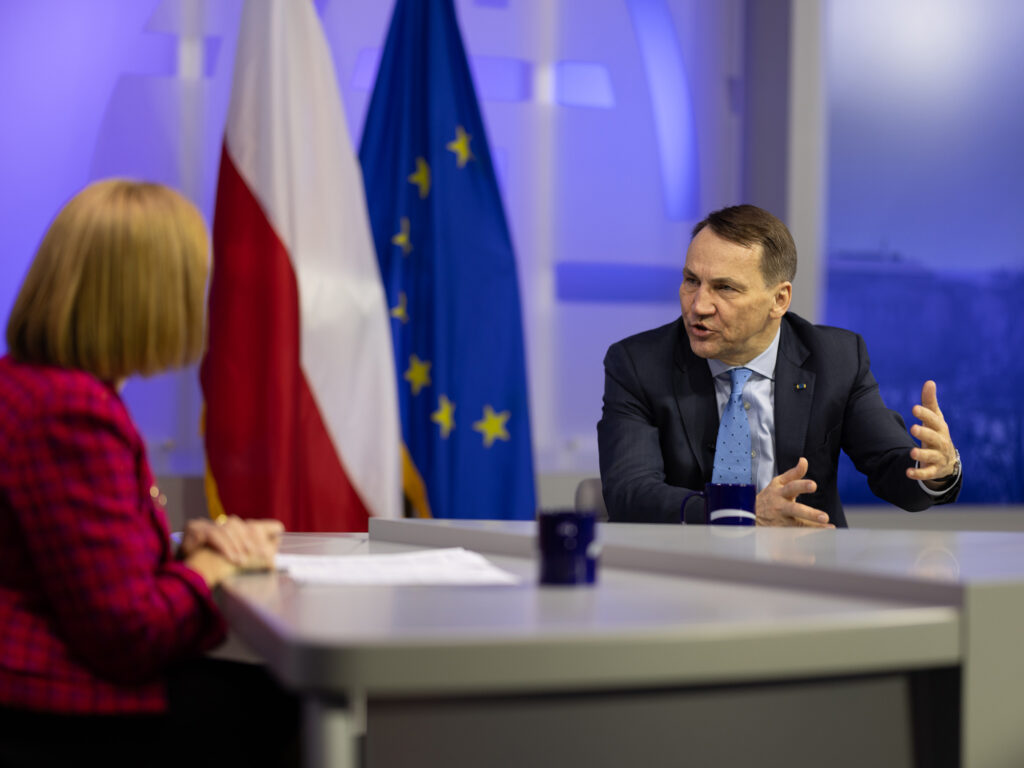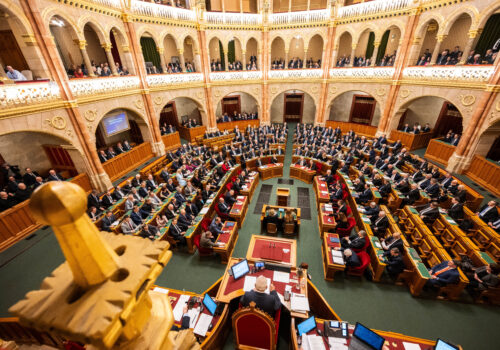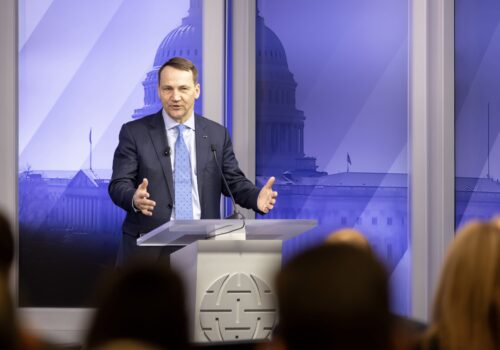Perhaps it takes a Polish leader—one with an American wife and a son who is a US soldier—to explain to a US Congressional minority why its reluctance to arm Ukraine is putting the global future at risk.
Polish Foreign Minister Radosław “Radek” Sikorski, speaking yesterday at the Atlantic Council, appealed to US House Speaker Mike Johnson to “let democracy take its course” and bring to a vote the Senate’s bill that would bring more than sixty billion dollars in crucially needed military and financial aid to Ukraine.
“I’d like him to know that the whole world is watching what he would do,” said Sikorski. “And if this supplemental were not to pass and Ukraine were to suffer reversals on the battlefield, it will be his responsibility.”
Sikorski spoke with a clarity that cut through the sometimes mushy rhetoric of Washington that fails to connect the despotic dots that some US lawmakers ignore at our peril. Having grown up in a Poland under Soviet communist rule, Sikorski sees the battle as one against a new array of autocrats.
“The murderous invasion of Ukraine is aided and abetted by a crime family of dictators from Iran [and] North Korea,” Sikorski said, “but also lauded by, among others, those ruling Cuba, Venezuela, and Syria. [Russian President Vladimir] Putin, in turn, helps his fellow despots fuel chaos in the Middle East, Asia, and here on [the US] southern border. He welcomes Hamas in Moscow, and his propaganda supports those terrorists.”
He continued: “China helps Russia economically, and in turn benefits from cheap oil and gas that Putin is selling to fund his war machine. They all desire to destroy the stability of America and to create victory where it is not deserved.”
Read every word of his powerful speech, as it not only lays out the historic stakes; it also delivers the solution and explains why providing Ukraine financing now is a tremendous bargain for a US defense budget that has seldom spent so effectively.
Sikorski reported that the United States has contributed roughly five percent of its annual defense budget to security assistance for Ukraine, “and with that money, Ukraine has already managed to destroy Putin’s combat capacity by 50 percent—without any American troops firing a single shot. A truly stunning return on investment.”
According to Sikorski, most of that investment is spent in the United States: “Up to 90 percent goes directly to [creating] American jobs on American soil,” he cited, explaining that newly made equipment in the United States replaces stockpiles of older US weaponry being sent to Ukraine.
Most important is the vision Sikorski lays out for “the path to security in the twenty-first century,” where the combined scale of investment in security across the Atlantic “dwarfs” what Putin and other dictators can summon. He concedes Europe had been slow to spend sufficiently, but that it has turned a corner—and has responded to US criticism.
The bottom line from Sikorski:
“Whether we want it or not, Putin’s decision to start the biggest war in Europe since the defeat of Nazi Germany has already changed the course of history. It is up to us to decide if we want to shape that course ourselves, or let it be shaped by others—in Moscow, Tehran, or Beijing.”
Last weekend, Sikorski spoke on CNN with Fareed Zakaria on how, during his childhood in a small village in Poland, he learned from Voice of America about the benefits of freedom and the oppression of what he called his Soviet colony of Poland. Now, this Voice of Poland is reminding Americans of their global purpose and of why “helping Ukraine by defeating Putin is the right thing to do in the broadest sense of the word.”
“It is morally sound, strategically wise, militarily justified, and economically beneficial,” he said. “Now is the moment to act. Let’s get this done.”
Frederick Kempe is president and chief executive officer of the Atlantic Council. You can follow him on Twitter: @FredKempe.
This edition is part of Frederick Kempe’s Inflection Points Today newsletter, a column of quick-hit insights on a world in transition. To receive this newsletter throughout the week, sign up here.
Further reading
Mon, Feb 26, 2024
It’s Swe-done: What’s next for NATO now that Hungary has approved Sweden’s bid to join
New Atlanticist By
Hungary’s parliament has ratified Sweden’s accession to NATO, the final approval needed. Atlantic Council experts share their insights on the about-to-be thirty-two member Alliance.
Fri, Feb 23, 2024
The toll on Russia from its war in Ukraine, by the numbers
New Atlanticist By
Our experts quantify the staggering self-inflicted wounds Russia has suffered since Putin launched the full-scale invasion of Ukraine.
Mon, Feb 26, 2024
Polish Foreign Minister Radosław Sikorski: ‘Helping Ukraine is not only a good deed. It’s also a good deal.’
New Atlanticist By
The United States must continue to back Ukraine and deepen its alliances to stop Putin's aggression and prevent a wider global conflict.
Image: Polish Foreign Minister Radosław Sikorski speaks at the Atlantic Council on February 26, 2024. Credit: Konrad Laskowski/MSZ.



